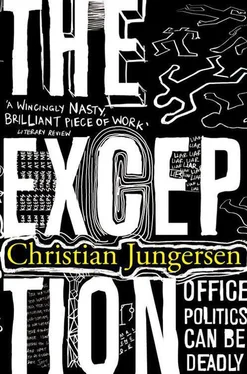Christian Jungersen - The Exception
Здесь есть возможность читать онлайн «Christian Jungersen - The Exception» весь текст электронной книги совершенно бесплатно (целиком полную версию без сокращений). В некоторых случаях можно слушать аудио, скачать через торрент в формате fb2 и присутствует краткое содержание. Год выпуска: 2010, Издательство: Orion Books, Жанр: Современная проза, Триллер, на английском языке. Описание произведения, (предисловие) а так же отзывы посетителей доступны на портале библиотеки ЛибКат.
- Название:The Exception
- Автор:
- Издательство:Orion Books
- Жанр:
- Год:2010
- ISBN:нет данных
- Рейтинг книги:3 / 5. Голосов: 1
-
Избранное:Добавить в избранное
- Отзывы:
-
Ваша оценка:
- 60
- 1
- 2
- 3
- 4
- 5
The Exception: краткое содержание, описание и аннотация
Предлагаем к чтению аннотацию, описание, краткое содержание или предисловие (зависит от того, что написал сам автор книги «The Exception»). Если вы не нашли необходимую информацию о книге — напишите в комментариях, мы постараемся отыскать её.
The Exception — читать онлайн бесплатно полную книгу (весь текст) целиком
Ниже представлен текст книги, разбитый по страницам. Система сохранения места последней прочитанной страницы, позволяет с удобством читать онлайн бесплатно книгу «The Exception», без необходимости каждый раз заново искать на чём Вы остановились. Поставьте закладку, и сможете в любой момент перейти на страницу, на которой закончили чтение.
Интервал:
Закладка:
Does Paul intend to make them work as if nothing has happened?
Anne-Lise looks around. Aren’t the others finding Paul’s manner hard to take as well? She sees that everyone is pretending that it’s all quite normal.
‘It follows that the Armenians will be on the parliamentary agenda of the Danish Parliament. Both our own media and the EU’s will be falling over each other to run the story. That is why we must be the source for all the most vital and up-to-date information on the subject. In print and on the Internet. In English as well as Danish.’
He turns to Iben. ‘This should be our top priority. Drop Chechnya for now. An issue packed with information on Turkey should be ready to go to the printers in a month’s time. We must present the best data, the best background briefings and interviews — in Europe!’ When Paul is fired up about something, his enthusiasm is impressive.
‘Our website must offer the best set of links. When you get to work, keep thinking: What’s hidden in this region that no one else has thought of? Think history! We need to be ten times smarter than the press.’
He relaxes for a moment. ‘Over to you, Anne-Lise. Any books we should know about in order to write this up? Any magazines that have already featured the subject?’
This is new. Not Paul, nor any of the others, has ever turned to her in this way, she thinks. This is it. I’ve waited a whole year and now it’s happened. At last they’re letting me in.
She starts to speak. ‘There’s definitely …’
Then she dries up.
‘I’m sure …’ She can’t think of anything else to say.
The others glance knowingly at each other. It’s totally infuriating. But it’s her own fault. She is the one who isn’t behaving professionally.
Paul turns to Iben. ‘Iben, do you have any ideas?’
Of course she has. Iben smiles. There is no hint in her manner that only fifteen minutes ago Ole proved Paul to be deceitful.
‘If we approach the foreign freelance journalists, the guys on the spot, we’ll get information well beyond our usual range. And there is no problem about compiling an overview of the responses from each of the larger EU states to genocides in Turkey and elsewhere.’
Anne-Lise doesn’t take in the rest of what she says, because she is preoccupied by the image of Iben running into the library, holding an empty bottle of rum and hiding it in the cupboard. It is beyond Anne-Lise’s understanding how this cool-headed, persuasive academic is the same manipulative, childish person.
Iben is reaching the end of her suggestions: ‘ …would give our clients a better chance of informing themselves not only about the subject itself, but also about the basis for joint European decision making.’
Paul swallows the last of his croissant as he listens to Iben. ‘Great! Well done, Iben! Anne-Lise, we need you to be in on this too.’
Somewhere inside Anne-Lise a fuse has blown. The fantasy of Iben feeling the war criminal’s knife against her throat in the harsh light of the stairway plays over and over. It is only through a haze that Anne-Lise sees Paul wiping crumbs off his mouth. His lips keep moving, talking to her.
‘It’s important that you don’t just trace lots of articles and review papers, but that you also work with Iben to select the most useful ones. You two will have to work as a team. What do you think?’
Iben’s clawed hand grips the war criminal’s leather jacket. She tugs violently at it. He doesn’t react at all. His movements are so assured, so experienced. The big man has done this many times before.
Anne-Lise shakes herself. Is this what Yngve warned me against? she wonders. Am I burnt out? Is that why I can’t concentrate?
She looks quickly around the circle of her colleagues. Paul has seen it. Now he has to admit that the others were right all along. I’m incompetent. I’ll be fired and they will have succeeded.
Her head clears enough to tune back in as Paul is finishing his speech.
‘The themed issue of Genocide News will also serve to legitimise our existence in the eyes of the politicians. The thing is to be on the offensive. If we can produce the best printed and website info on this subject, it will be harder to close us down. So — Iben, Anne-Lise — next month you’re working for the Centre’s survival as well.’
Anne-Lise’s head is spinning. Has he asked me to do something else? Yes, he must have. I’ve no idea what it is. Is it true that I’m impossible to work with? Yes, of course it’s true.
After the meeting, Anne-Lise has a headache.
She stops in the library doorway and puts on her winter coat and scarf. The painkillers seem to have had no effect. Her eyes narrow in the Winter Garden’s bright fluorescent light. Staring down at the floor, she speaks quietly. ‘I need to go home. I’m not feeling well. That’s why I couldn’t concentrate earlier on.’
Paul is there too. Camilla smiles at Anne-Lise and makes sure that he sees it. She says in a loud voice that she had no idea that Anne-Lise wasn’t focused, she seemed as attentive as ever.
Outside the December weather is cold and grey. Anne-Lise manages to drive along the motorway towards Holte without any problems, but after turning onto Vase Road she almost misses seeing a cyclist in the dim light. She slams on the brakes seconds before hitting his rear mudguard. Without looking round, she swerves the car until it comes to a halt perpendicular to the road. The car behind her does a grinding emergency stop. There’s a small shudder as it hits her own car.
The driver leaps out. Together with the cyclist, they shout at her and bang their hands on her car. The driver says that his front bumper is dented and demands her telephone number and insurance details. Anne-Lise obliges.
She manages to park off the road. She and the driver exchange phone numbers. He asks her if she’s in a bad way, implying that she’s either drunk or high. She tells him that she has a headache. Once he has gone, she sits for a while in her car with her head in her hands.
Eventually she decides that driving is too risky. It is less than a kilometre to her house, so she can leave the car where it is and walk the rest of the way.
Anne-Lise walks along a road lined with villas, close to a hedge whose long, bare branches form a prickly canopy over her head. The pain is so bad that she can’t bear looking up.
A woman’s voice calls out. ‘Brigitte!’
After hearing the name called a couple more times, Anne-Lise glances around. There’s only a woman she doesn’t recognise, so Anne-Lise starts to walk again; but the woman catches up with her.
‘I knew it was you! Camilla’s friend! So nice to see you! Do you live near here?’
Anne-Lise cannot think what she is talking about. The woman notices her blank stare. ‘You don’t remember me, do you? The choir. The Copenhagen Postal Choir.’
‘Oh!’
Anne-Lise feels dizzy. Her headache makes it hard to think. Even so, she knows that if this woman discovers that ‘Brigitte’ is in fact Anne-Lise, Camilla will find out. And then her colleagues will not hesitate to stick the label ‘mentally ill’ on Anne-Lise for good.
The woman is dressed expensively in a blue, woollen coat that is almost full-length. The shade of her lipstick is far too bright for her age. Anne-Lise can’t help but feel that this woman seems confused and a little disturbed.
‘Brigitte, do you live round here too? We do need a choir here instead of in town.’
Anne-Lise is only a hundred metres or so from her home. ‘I’m afraid I don’t. I’m just visiting … an old friend of mine.’
‘Not Camilla? Or has she moved out here?’ The woman obviously doesn’t remember how Anne-Lise’s evening at choir practice had ended up.
Читать дальшеИнтервал:
Закладка:
Похожие книги на «The Exception»
Представляем Вашему вниманию похожие книги на «The Exception» списком для выбора. Мы отобрали схожую по названию и смыслу литературу в надежде предоставить читателям больше вариантов отыскать новые, интересные, ещё непрочитанные произведения.
Обсуждение, отзывы о книге «The Exception» и просто собственные мнения читателей. Оставьте ваши комментарии, напишите, что Вы думаете о произведении, его смысле или главных героях. Укажите что конкретно понравилось, а что нет, и почему Вы так считаете.












